 9 citations,
June 2014 in “Nutrition and Cancer”
9 citations,
June 2014 in “Nutrition and Cancer” Eclipta alba extract may work as an anticancer agent and help reverse drug resistance.
 9 citations,
March 2011 in “Current Pharmaceutical Biotechnology”
9 citations,
March 2011 in “Current Pharmaceutical Biotechnology” Stem cell therapies show promise for treating various diseases but face challenges in clinical use and require better monitoring techniques.
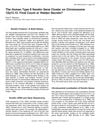 9 citations,
February 2005 in “The journal of investigative dermatology/Journal of investigative dermatology”
9 citations,
February 2005 in “The journal of investigative dermatology/Journal of investigative dermatology” The document concludes that the human keratin gene cluster is complex, with a need for updated naming to reflect over 50 functional genes important for hair and skin biology.
 8 citations,
December 2020 in “Scientific reports”
8 citations,
December 2020 in “Scientific reports” Selective breeding caused the unique curly hair in Mangalitza pigs.
 8 citations,
December 2015 in “The Journal of Physiology”
8 citations,
December 2015 in “The Journal of Physiology” The document concludes that stem cell inactivity is actively controlled and important for tissue repair and balance.
 8 citations,
February 2014 in “Stem cells translational medicine”
8 citations,
February 2014 in “Stem cells translational medicine” Modified stem cells that overexpress a specific protein can improve hair growth and reduce hair abnormalities in mice.
 8 citations,
June 2012 in “PloS one”
8 citations,
June 2012 in “PloS one” Mutations in Plcd1 and Plcd3 together cause severe hair loss in mice.
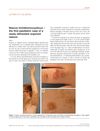 8 citations,
April 2010 in “JEADV. Journal of the European Academy of Dermatology and Venereology/Journal of the European Academy of Dermatology and Venereology”
8 citations,
April 2010 in “JEADV. Journal of the European Academy of Dermatology and Venereology/Journal of the European Academy of Dermatology and Venereology” The first pediatric case of naevus trichilemmocysticus was documented.
 7 citations,
January 2021 in “Evidence-based complementary and alternative medicine”
7 citations,
January 2021 in “Evidence-based complementary and alternative medicine” Porphyra-334 may help reduce wrinkles and promote hair growth.
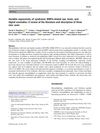 7 citations,
May 2019 in “European Journal of Human Genetics”
7 citations,
May 2019 in “European Journal of Human Genetics” BMP4-related anomalies can cause a wide range of eye, brain, and hand/foot problems, and new cases show this variability.
 7 citations,
January 2015 in “Genetics and molecular research”
7 citations,
January 2015 in “Genetics and molecular research” The RORα gene is active in different parts of cashmere goat hair follicles and may be influenced by melatonin, especially in December when hair growth changes.
 7 citations,
July 2014 in “Reproductive Biomedicine Online”
7 citations,
July 2014 in “Reproductive Biomedicine Online” The length of CAG repeats in the androgen receptor gene is linked to ovarian reserve but does not affect how the ovaries respond to stimulation.
 7 citations,
April 2012 in “Biomolecular concepts”
7 citations,
April 2012 in “Biomolecular concepts” Keratin is crucial for keeping skin cells healthy and its changes can lead to diseases and affect cell behavior.
 7 citations,
March 2012 in “European Journal of Pediatrics”
7 citations,
March 2012 in “European Journal of Pediatrics” A boy with a rare skin condition and kidney disease improved with cyclosporine after steroids failed, suggesting a new treatment approach.
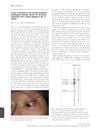 7 citations,
February 2010 in “British Journal of Dermatology”
7 citations,
February 2010 in “British Journal of Dermatology” A woman with a rare autoimmune disorder had a blister on her eye and unique immune reaction, which was effectively treated with medication.
 7 citations,
May 2005 in “Experimental Dermatology”
7 citations,
May 2005 in “Experimental Dermatology” Two mouse mutations cause similar hair loss despite different skin changes.
 7 citations,
January 2003 in “Elsevier eBooks”
7 citations,
January 2003 in “Elsevier eBooks” Testosterone is crucial for development, growth, and various body functions in mammals.
 7 citations,
November 2000 in “Clinics in Dermatology”
7 citations,
November 2000 in “Clinics in Dermatology” Most hair loss in children is caused by a few common conditions and is easy to diagnose, but rare types require careful evaluation.
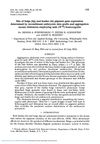 7 citations,
October 1985 in “Genetics Research”
7 citations,
October 1985 in “Genetics Research” Beige and leaden pigment genes act within melanocytes, affecting pigment patterns.
 6 citations,
October 2022 in “Journal of cell science”
6 citations,
October 2022 in “Journal of cell science” Keratin genes change gradually during skin cell development and should be used carefully as biomarkers.
 6 citations,
January 2020 in “BMC Neuroscience”
6 citations,
January 2020 in “BMC Neuroscience” Male tissue has more cell death than female tissue after ischemia, and some neurosteroids only protect female cells.
 6 citations,
June 2017 in “Reproductive Biomedicine Online”
6 citations,
June 2017 in “Reproductive Biomedicine Online” Chinese women with PCOS have higher androgen levels, which change with age and weight.
 6 citations,
January 2017 in “Advances in Experimental Medicine and Biology”
6 citations,
January 2017 in “Advances in Experimental Medicine and Biology” Runx genes are important for stem cell regulation and their roles in aging and disease need more research.
 6 citations,
May 2006 in “Skinmed”
6 citations,
May 2006 in “Skinmed” Androgens contribute to common male hair loss; more research needed for hair growth medication.
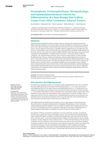 5 citations,
August 2020 in “Curēus”
5 citations,
August 2020 in “Curēus” The document concludes that recent studies help tell apart desmoplastic trichoepitheliomas from other skin tumors, but more research is needed for clear differentiation.
 5 citations,
January 2017 in “Dermatologic Surgery”
5 citations,
January 2017 in “Dermatologic Surgery” Storing hair follicle micrografts for longer times can cause them to enter a state similar to the natural hair shedding phase, which might impact hair transplant results.
 5 citations,
January 2017 in “Endocrinology”
5 citations,
January 2017 in “Endocrinology” Genetic defects in testosterone production can cause hormonal and developmental disorders, and more research is needed to understand androgen regulation and develop safer treatments.
 5 citations,
September 2016 in “Security science and technology”
5 citations,
September 2016 in “Security science and technology” DNA can predict physical traits like eye and hair color accurately, especially in Europeans, but predicting other traits and in diverse populations needs more research.
 5 citations,
April 2013 in “Nasza Dermatologia Online”
5 citations,
April 2013 in “Nasza Dermatologia Online” Oral zinc therapy is effective for treating acrodermatitis enteropathica.
 5 citations,
May 2011 in “European Journal of Medical Genetics”
5 citations,
May 2011 in “European Journal of Medical Genetics” A genetic duplication on chromosome 5 was linked to a woman's unique combination of medical conditions.






























